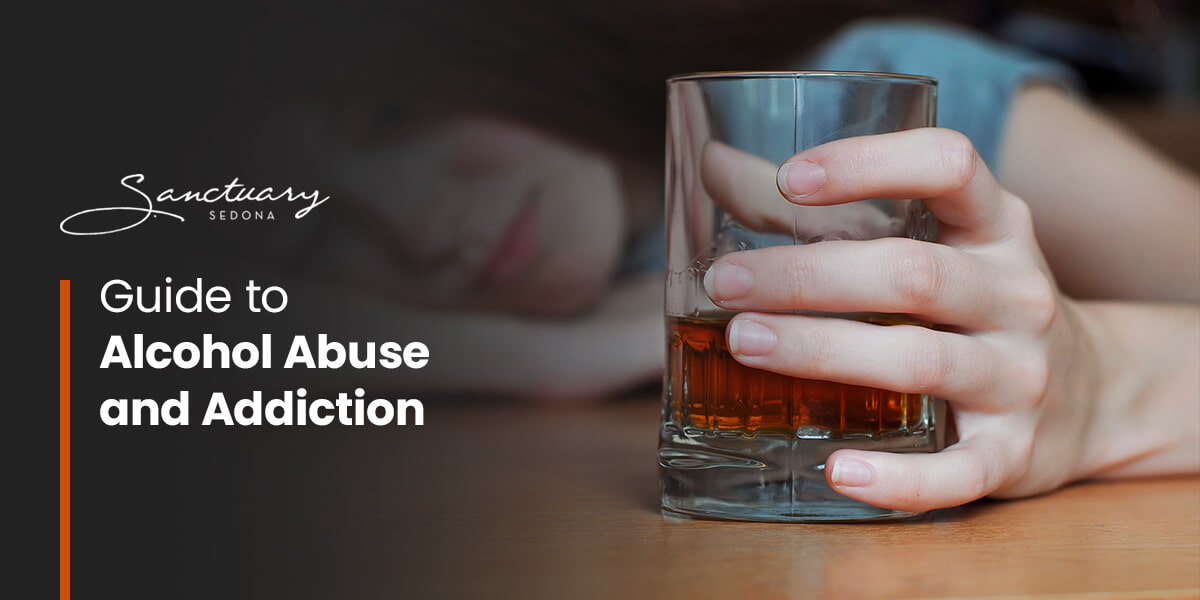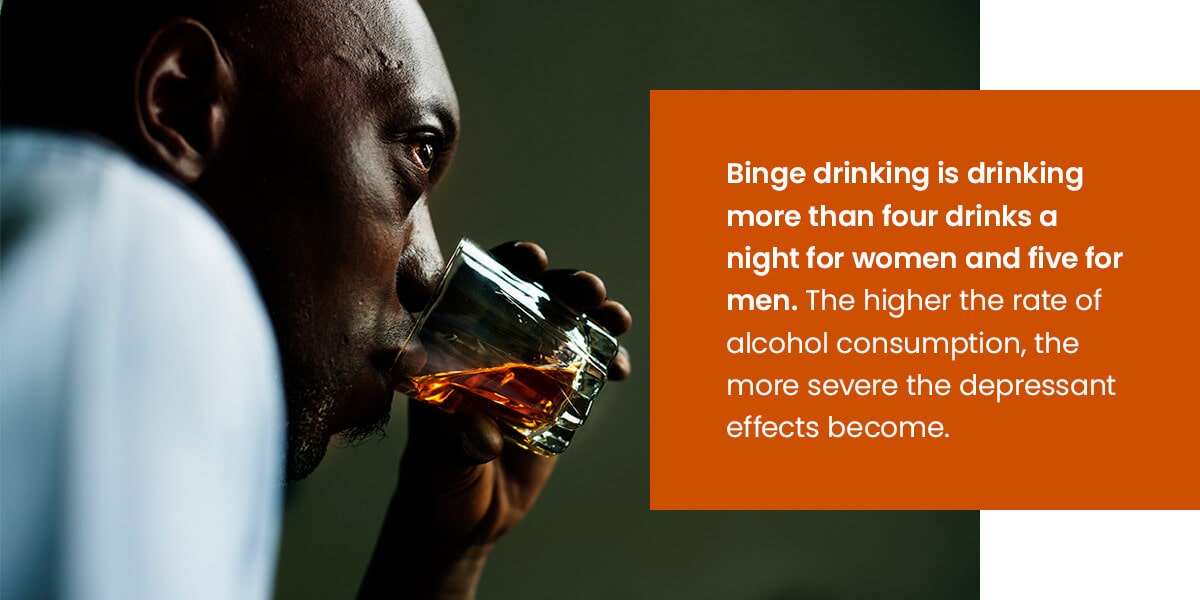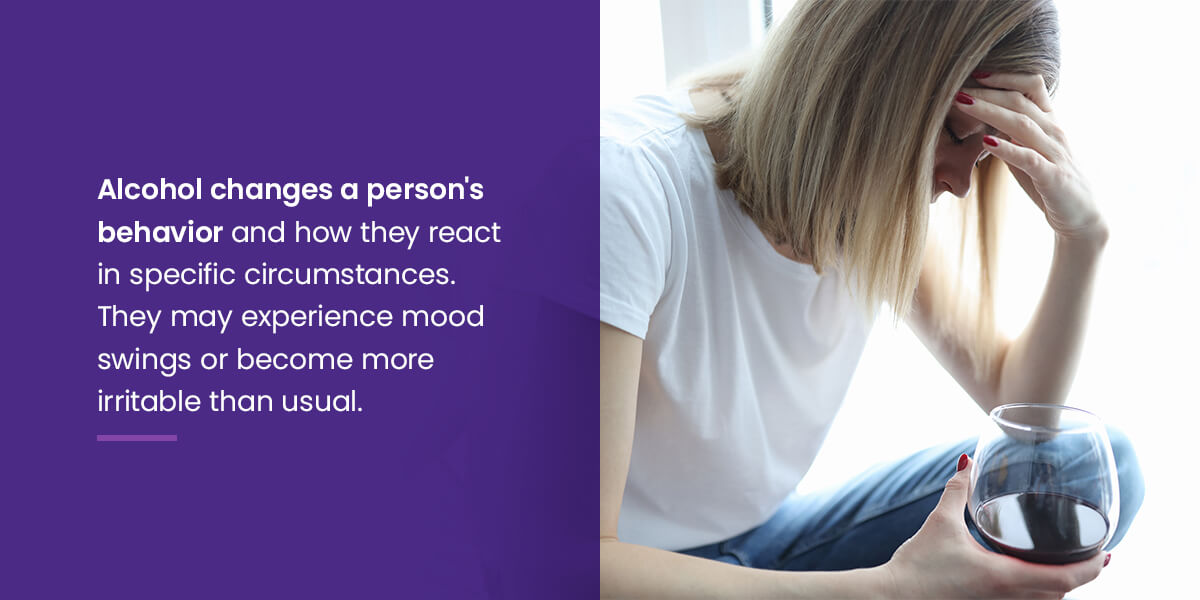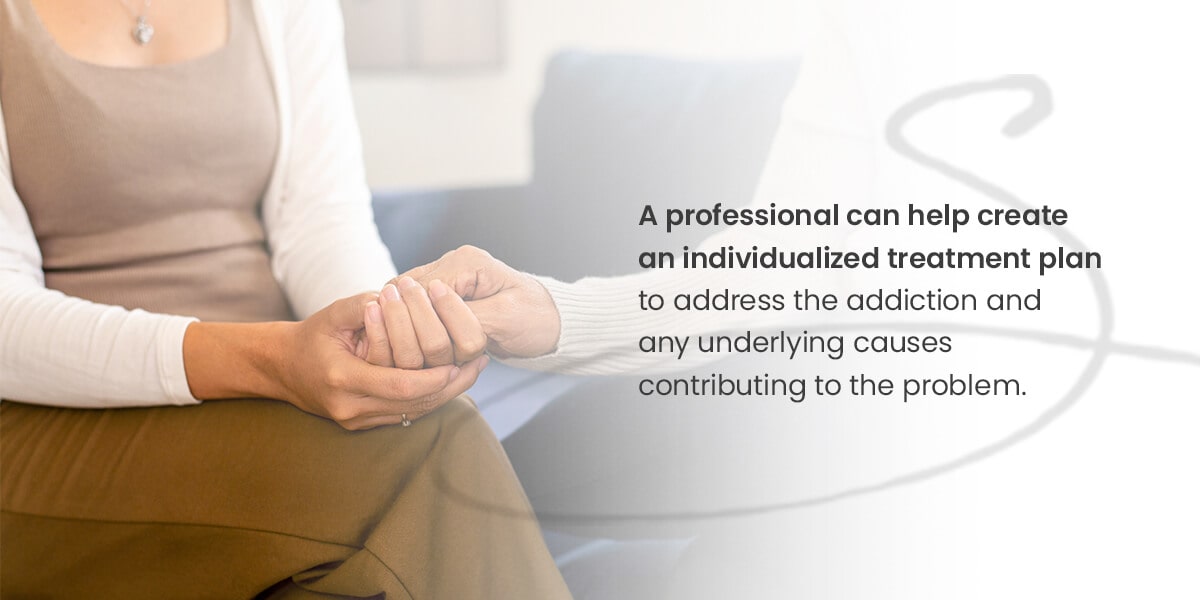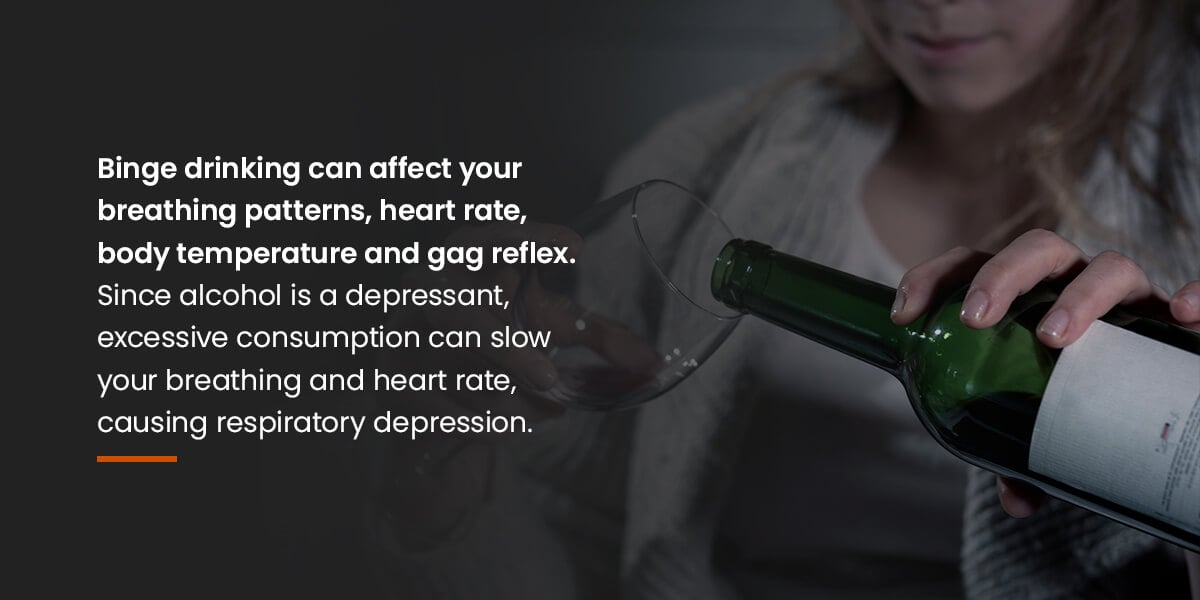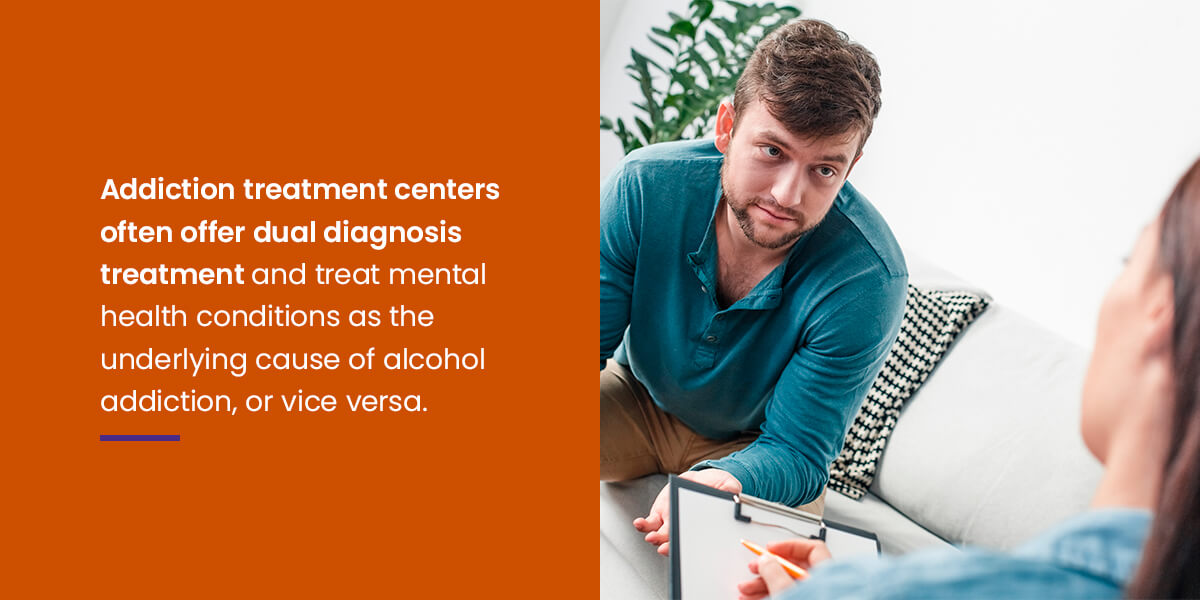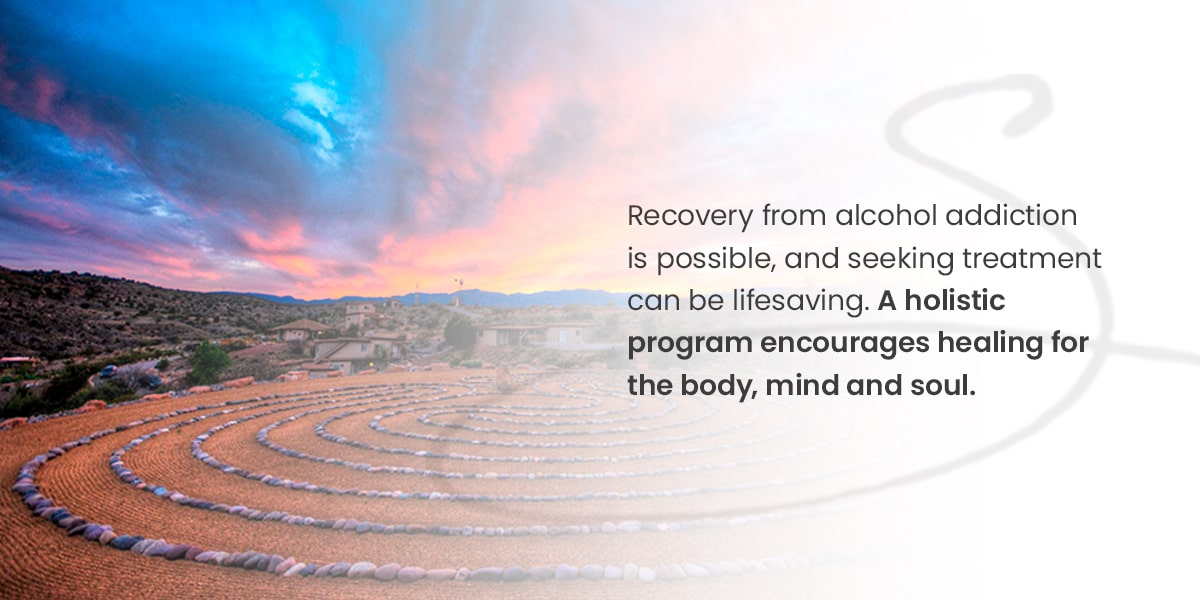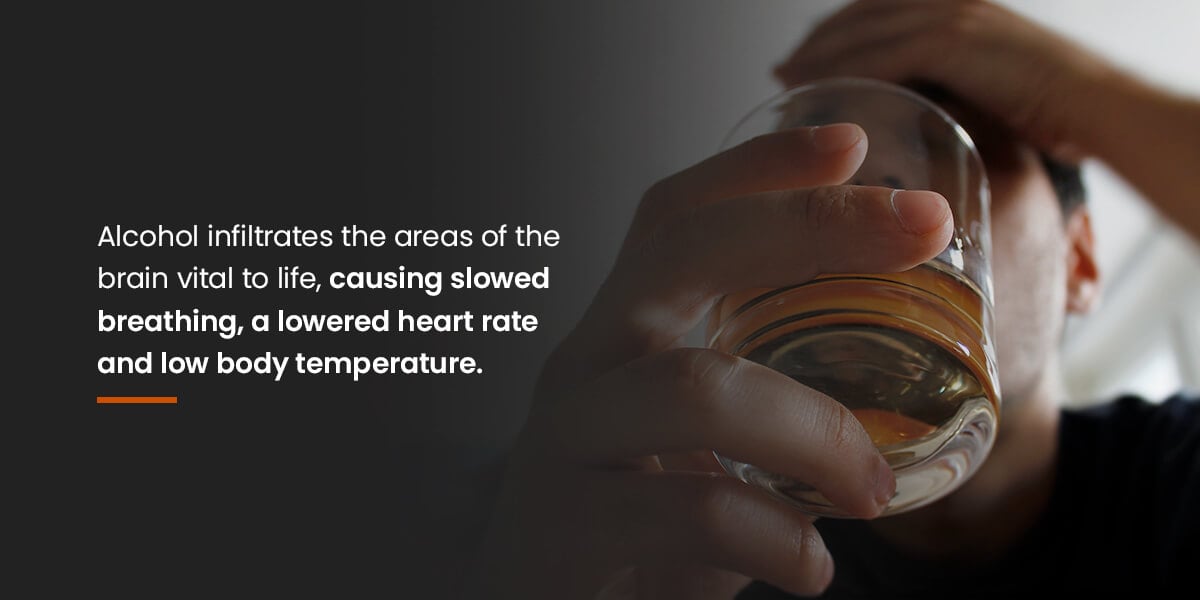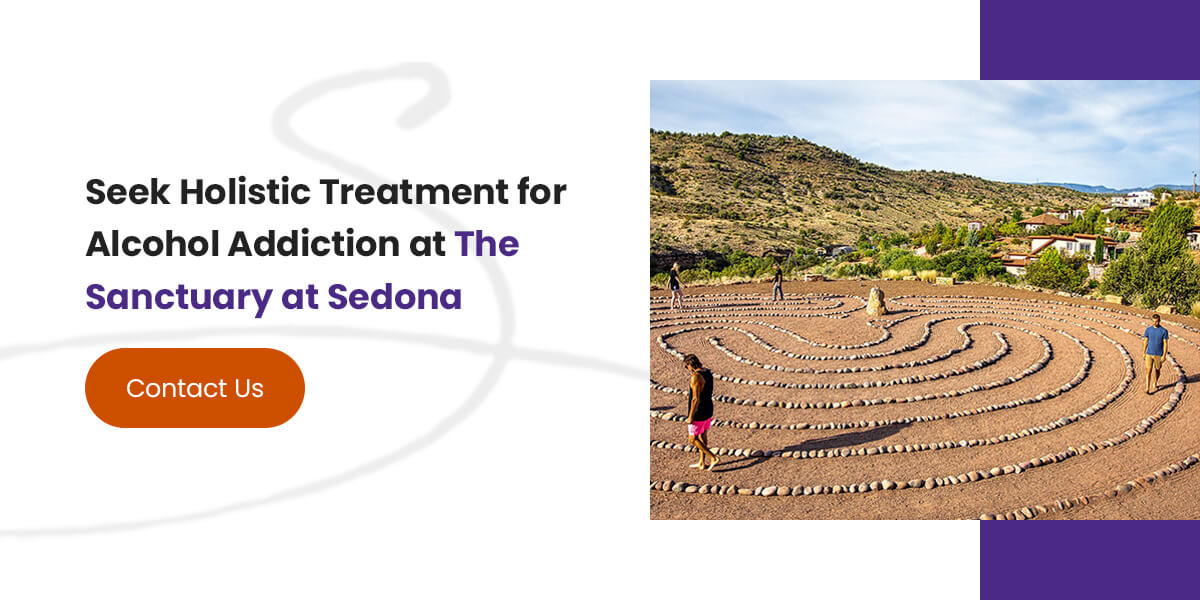Alcohol is one of the most commonly abused substances in the United States. Over 85% of adults have had alcohol at some point in their lives, and 7% of adults have an alcohol use disorder (AUD).
Alcohol addiction can have severe implications on an individual’s physical, mental and emotional health. They can also experience challenges in their personal and professional lives. Below, we’ll explain what alcohol addiction is, the signs and symptoms, the effects of alcohol abuse and addiction and the types of treatment available.
The Difference Between Alcohol Abuse and Addiction
Alcohol, otherwise known as ethanol or ethyl alcohol, is found in wine, beer, liquor and other spirits. Alcohol is fermented from wheat, potatoes, fruits or other sources of sugar. Drinking alcohol causes intoxication and is classified as a central nervous system depressant. It slows down vital bodily functions and often impacts balance, brain activity, mood, physical and mental health.
The amount of alcohol consumed determines how much it depresses the body. Many people drink alcohol for its stimulating effects, but drinking more than the body can break down will cause a person to experience the depressant effects of alcohol.
Drinking in moderation is considered one drink a day for women and two drinks a day for men. Any more than this can increase the undesirable effects. Binge drinking is when you consume enough alcohol to bring your blood alcohol concentration (BAC) to 0.08 percent or higher. Binge drinking is drinking more than four drinks a night for women and five for men. The higher the rate of alcohol consumption, the more severe the depressant effects become.
People can become addicted to alcohol when they start using it to cope with uncomfortable feelings, stress and mental health conditions. Drinking as a coping mechanism can lead to alcohol abuse and addiction. It’s also common for many to drink in social gatherings with friends, family or coworkers. Risky drinking is often normalized in these settings, increasing the chance of addiction.
The perceived high and calming effects caused by alcohol can become addicting, whether it’s wanting to fit in with peers, numb pain sensations or calm the mind from intrusive or uncomfortable thoughts. People might continue to drink to achieve the desired effect, building their tolerance and increasing their cravings.
An increased tolerance can quickly lead to alcohol problems and dependence on the substance. A person will need to drink more to achieve the same effect, increasing the risk for adverse health effects. Alcohol addiction creates various physical, mental and emotional problems that can become severe without the proper treatment. Certain individuals are at a higher risk for alcohol addiction than others, including those:
- With a family history of alcohol abuse.
- With trauma or mental health conditions.
- In social groups or environments where drinking is encouraged.
- Who begin drinking at a young age.
- Who experience high levels of stress of low self-esteem.
- Who experience isolation or loneliness.
Even without these risk factors, it’s possible to develop an alcohol addiction. It’s crucial to be aware of the risks and practice caution when drinking. If you’re at an increased risk of alcohol addiction, it’s essential to analyze whether drinking at all is worth a potential addiction that can alter your quality of life.
Signs and Symptoms of Alcohol Abuse
Alcohol affects a person in various ways, impacting their physical, mental and emotional health. If you or a loved one suspect an alcohol addiction, there are signs and symptoms to watch for that indicate treatment is necessary.
Signs
Alcohol changes a person’s behavior and how they react in specific circumstances. They may experience mood swings or become more irritable than usual. Their physical and psychological health is also directly impacted. When a person becomes addicted to alcohol, there will be certain identifiable signs, such as:
- Consuming large amounts of alcohol to achieve the desired effect.
- Failed attempts to quit in the past.
- Intense cravings and increased tolerance.
- Failure to keep up with responsibilities at work or school.
- Challenges in personal relationships.
- Withdrawal symptoms when not drinking.
- Consistent reckless behavior.
- Continuous drinking despite the adverse effects.
- Defensive reactions when confronted about drinking.
- Neglecting personal hygiene.
- Giving up activities or hobbies for drinking.
These signs indicate a need for treatment to overcome alcohol addiction. If you notice any of these signs in yourself or a loved one, it might be time to consult with a professional to determine a suitable treatment method.
Symptoms
You can use the signs of alcohol addiction to identify a dependency on the substance in yourself or a loved one, but you can also look at the symptoms of alcohol misuse as an indication. Some of the physical, mental and emotional symptoms of alcohol abuse include:
- Memory problems.
- Mood changes.
- Anxiety or depression.
- Nausea or vomiting.
- Tremors or shaking.
- Cramping.
- Sleep disturbances.
- Flushed skin.
- Difficulty concentrating.
Some of these symptoms will be apparent while under the influence. However, many of these problems present themselves after a period of consistent alcohol consumption.
If you notice any signs or symptoms of alcohol addiction in yourself or a loved one, it’s time to seek professional treatment. A professional can help create an individualized treatment plan to address the addiction and any underlying causes contributing to the problem. With treatment, you can get back on track and live a fulfilling, healthy life.
Effects of Alcohol Abuse and Addiction
Alcohol addiction can have a harmful effect on a person’s body when they don’t seek treatment. The longer an individual goes without treatment, the more severe the effects become. Seeking treatment from addiction professionals is the best way to overcome alcohol dependency and improve quality of life. Below are the short-term and long-term effects of alcohol misuse.
Short-Term Effects
The short-term effects of alcohol are experienced shortly after consuming alcohol. Once you drink more than the body can break down, the central nervous system becomes depressed and results in a range of effects, including:
- Slurred speech.
- Drowsiness.
- Upset stomach.
- Nausea or vomiting.
- Impaired judgment.
- Difficulty breathing.
- Dehydration.
- Problems with balance and coordination.
Drinking too much in one sitting can also cause alcohol poisoning. Binge drinking can affect your breathing patterns, heart rate, body temperature and gag reflex. Since alcohol is a depressant, excessive consumption can slow your breathing and heart rate, causing respiratory depression. Your body isn’t getting enough oxygen, and respiratory depression can potentially induce a coma. Alcohol poisoning can even be fatal in some instances.
Long-Term Effects
When you consume alcohol consistently over a period of time, the risk of severe long-term health effects increases. Binge drinking speeds up the rate of these effects, increasing their severity and presenting sooner. Some of the long-term effects of alcohol include:
- Unintentional injuries.
- High blood pressure.
- Sexual dysfunction.
- Sleep disturbances.
- Vitamin deficiency and malnutrition.
- Brain damage.
- Ulcers.
- Nerve damage and alcoholic neuropathy.
- Liver disease.
- Increased risk of heart attack or stroke.
- Cancer of the mouth or throat.
These are just the physical effects of long-term alcohol consumption. Alcohol addiction can also create long-term challenges in other aspects of life. For example, a person might not be as productive at work or school, causing them to lose their job or fail classes. They may even experience financial challenges that cause additional stress, leading to further alcohol consumption.
Alcohol addiction can also affect personal relationships. A person may prioritize drinking over their personal responsibilities, such as falling behind on childcare or neglecting intimate partners. Family members may become concerned about your drinking, and defensive or irritable reactions can push them away, increasing feelings of isolation and loneliness.
Excessive alcohol consumption is also linked to violent crime since it impairs judgment and increases aggression. People who commit crimes while under the influence are at risk for legal trouble. Getting behind the wheel of a car and driving intoxicated can result in a DUI, which carries various consequences. Any legal trouble incurred while drinking will be on your criminal record, influencing your ability to find work, drive a vehicle, find affordable insurance or secure a mortgage.
Without treatment, the long-term effects of alcohol can cause additional stress, driving a person to further their drinking habits. The best way to overcome alcohol addiction is to seek treatment from a professional and learn how to use healthy coping mechanisms to deal with stress and other triggers.
Alcohol And Co-Occurring Disorders
There is a known link between addiction and mental health disorders. Depression and anxiety are often accompanied by uncomfortable symptoms and feelings, and people sometimes turn to alcohol to cope. When a person relies on alcohol to self-medicate, they increase their risk of developing an AUD.
Even if you don’t have a mental health condition before drinking or are unaware a condition exists, alcohol abuse can cause certain mental disorders to develop or worsen. Drinking interferes with the chemicals in the brain responsible for our mental health. When these chemicals are off balance, symptoms of depression and anxiety can appear, making stress more challenging to handle. A sudden appearance of these symptoms can contribute to further drinking as a way to cope.
When an AUD and mental health condition exist simultaneously, they’re known as co-occurring disorders. Addiction treatment centers often offer dual diagnosis treatment and treat mental health conditions as the underlying cause of alcohol addiction, or vice versa. Targeting the underlying cause of alcohol abuse makes successful treatment and long-term recovery more likely.
It’s essential to develop healthy coping mechanisms to overcome mental health challenges and eliminate the dependency on alcohol. Using different methods to cope with stress or uncomfortable feelings include:
- Yoga and meditation.
- Breathing exercises.
- Exercise.
- Enjoying nature.
- Reading or watching TV.
- Journaling.
- Engaging in hobbies.
- Hanging out with supportive friends.
- Talking with a professional.
Treatment for mental health conditions varies based on your individual needs. However, learning healthy coping mechanisms can help you identify your triggers and address them in new ways, rather than turning to alcohol to cope. A quality addiction treatment program will treat co-occurring disorders to increase the chance of recovery. Healing the mind is a vital part of recovery and encourages a healthy lifestyle to improve your quality of life.
Can You Recover From an Alcohol Addiction?
Recovery from alcohol addiction is possible, and seeking treatment can be lifesaving. While alcohol addiction is a disease and can seem impossible to overcome, there are ways to treat the problem and reclaim your life. If you’ve tried traditional treatments and found little success, it might be time to try something different.
Many addiction treatment programs focus on the 12-step model, which doesn’t work for everyone. Some people still relapse, despite consistent participation in these programs, or may disagree with the established tenants. There are alternatives to this treatment model that can set you on the path of recovery.
Non-12 step holistic treatment is one of the best ways to overcome alcohol addiction. Holistic treatment focuses on treating your entire being, including your body, mind and soul. A non-12 step holistic approach uses evidence-based research combined with ancient healing and wisdom. This program allows you to treat addiction while addressing the underlying mental and emotional problems influencing alcohol misuse.
During the holistic treatment, the first few days are spent detoxing from alcohol and calming your mind. A few weeks into treatment, you’ll notice your outlook on life has changed and you’ll see what you’re truly capable of when it comes to your recovery. Non-12 step holistic treatment can empower you to heal every aspect of yourself, encouraging a healthy lifestyle and true freedom from addiction.
A holistic program encourages healing for the body, mind and soul. Whole person healing is achieved through a various combination of therapies, including:
- Cognitive-behavioral therapy (CBT).
- Eye movement desensitization and reprocessing (EMDR).
- Expressive art therapy.
- Inner child therapy.
- Movement therapy.
- Emotional self-regulation skills.
- Yoga and mindfulness meditation.
- Energy medicine therapy.
- Nutrition education and recovery-focused diet.
These are just a few of the therapies that make up holistic treatment. You’ll undergo various forms of therapy while receiving holistic treatment to increase your chance of recovery.
Healing of the mind focuses on psychiatric or psychological therapies to get to the root of the problem and uncover existing mental health conditions. Therapy takes place on an individual level at least once a day. Other holistic treatments, such as acupuncture, may supplement treatment.
Healing of the body focuses on cleansing the body of alcohol and calming the nervous system to encourage effective treatment and reduce anxiety. Treatment may include a nutrient-rich diet, bodywork, eco-therapy and physical exercise.
Finally, there is a focus on healing the soul and spirit. Treatment is focused on allowing self-expression, releasing toxic energy and restoring clarity. The goal is to repair the bond with an individual’s soul and improve their connection with their spirit.
When all of these parts experience healing together, the whole body balances. The chance of recovery from alcohol addiction increases, and relapse becomes less likely. If you’ve experienced difficulty in the past with traditional addiction treatment, consider non-12 step holistic treatment as a new alternative.
Alcohol Abuse FAQs
It’s common to have questions concerning alcohol addiction and the recovery process. There are a lot of factors at play, and the process can be overwhelming. Below, we’ll answer some of the most frequently asked questions to give you better insight into alcohol addiction.
1. Can You Overdose on Alcohol?
An overdose on alcohol is also known as alcohol poisoning. Alcohol poisoning occurs when a person binge drinks and too much alcohol enters the bloodstream. Alcohol infiltrates the areas of the brain vital to life, causing slowed breathing, a lowered heart rate and low body temperature. Binge drinking can cause respiratory depression, slowing breathing enough to limit oxygen intake, which can induce a coma or death.
Other symptoms of an alcohol overdose include:
- Trouble staying awake.
- Confusion.
- Vomiting.
- Seizures.
- Clammy skin.
- Decreased gag reflex.
If someone experiences an alcohol overdose, it’s essential to get medical assistance right away to prevent severe damage.
2. What Withdrawal Symptoms are Associated With Alcohol Abuse?
If you or a loved one have developed a chemical dependency on alcohol, the body has adjusted to having alcohol all the time. When alcohol consumption suddenly stops or decreases significantly, you’ll experience withdrawal symptoms. Alcohol withdrawal symptoms include:
- Increased anxiety.
- Irritability.
- Headaches or migraines.
- Nausea or vomiting.
- Insomnia.
- Sweating.
- Tremors or shaking.
- Disorientation.
- Feeling ill.
These uncomfortable symptoms can deter a person from committing to recovery. However, professional treatment can reduce these feelings and make withdrawal symptoms more bearable until the body readjusts to sobriety.
3. How Do You Know if You are Addicted to Alcohol?
If you’re trying to determine if you’re addicted to alcohol and need help, there are a few signs you can look out for:
- Inability to control how much you drink
- Spending a large amount of time drinking
- Increased tolerance to alcohol
- Experiencing cravings
- Giving up other activities or hobbies
- Failing to keep up with responsibilities
- Experiencing challenges in relationships
- Experiencing withdrawal symptoms
- Getting into legal trouble
- Engaging in reckless behavior
- Inability to quit despite the consequences
If you experience any of the short-term or long-term effects of alcohol abuse, such as impaired judgment, memory problems, mood changes or difficulty concentrating, it can indicate an alcohol addiction.
4. How Do You Help Someone With an Alcohol Problem?
If a loved one is addicted to alcohol, there are a few ways you can help with alcohol abuse and addiction:
- Be honest: One of the best ways to encourage a loved one to seek treatment is being honest about how you’re feeling about their alcohol consumption. Let them know how their drinking has affected you, but do your best not to blame them. Talk to them when they’re sober and calm. Don’t be afraid to list consequences and follow through if they don’t make an effort to improve their drinking habits.
- Curb all excuses: Family and friends can often make excuses for a loved one’s behavior, enabling them to continue drinking. Once you stop making excuses for their behavior, they’ll understand the actual consequences of their behavior.
- Educate yourself: Understanding how alcohol addiction works and affects an individual can prepare you to help your loved one.
- Seek professional support: Setting up support or treatment for your loved one can take the stress off their shoulders. Offer to go with your loved one to a treatment center or call to set up and appointment for them. Let them know professional help is one of the best ways to overcome addiction and get their life back on track.
Seek Holistic Treatment for Alcohol Addiction at The Sanctuary at Sedona
Alcohol addiction can affect a person’s health, relationships and professional life. If you’ve tried to overcome alcohol addiction in the past but have found limited success, it might be time to try holistic treatment at The Sanctuary at Sedona. We combine evidence-based clinical treatment with holistic methods to health the body, mind, soul and spirit. You’ll be able to recover in an intimate environment with the beauty of Sedona, Arizona, surrounding you.
We treat the underlying cause of addiction and provide you with resources to improve your quality of life. We are dedicated to providing you with quality care and resolving the root causes of your addiction. Contact us today to learn more about our programs and how we can help.

